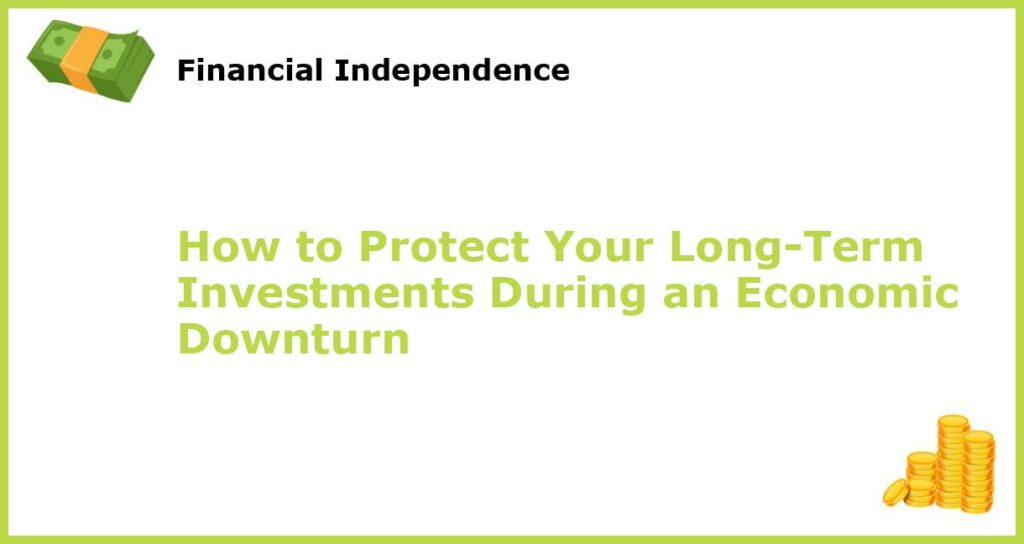Investing in the long-term can offer great financial rewards, but it can also be daunting, particularly when there is an economic downturn. As we have seen, the COVID-19 outbreak had a significant impact on the global economy. While the markets have mostly rebounded, it’s important to think about strategies to protect your investments if similar situations arise in the future. In this article, we will discuss some tips on how to protect your long-term investments during an economic downturn
1. Review Your Portfolio

Reviewing your portfolio should be the first thing you do when you consider protecting your investments during an economic downturn. One of the most critical things you can do is assess the amount of risk you are willing to take. With a recession, you want to make sure your investments are stable enough to weather the effect. You should also examine your investments to see if they are diversified. Diversification is key to ensuring your portfolio receives sufficient protection during tough economic times.
2. Consider Bonds

It is risky to stock up all of your investments in a particular category such as stocks, mutual funds, or exchange-traded funds (ETF). Bonds, on the other hand, can provide a steadier income. They are less risky than stocks and can be a source of stability in your portfolio. During an economic downturn, you should consider adding bonds to your investment mix to protect your investments.
3. Invest in Defensive Stocks

It is advisable to invest in defensive stocks during an economic downturn. Defensive stocks are stocks that are less affected by economic downturns. Healthcare, utilities, and consumer staples are some examples of defensive stock options. They are usually companies with stable earnings and qualities that are necessary for everyday life. So, even in a recession, people will still require them. Adding these types of stocks to your portfolio will help protect your investments during tough economic times.
4. Avoid Panic Selling

Panic selling can have a great impact on your investments during an economic downturn. The temptation to sell off your investments in a market crash is always high, but unfortunately, it can cause enormous losses. If you sell off your investments when the market is low, you will be selling them for a loss. Always try to stay calm and think long-term. It’s essential to remember that most economic downturns are temporary, and the market will eventually rebound.
5. Use Dollar-Cost Averaging
Dollar-cost averaging is a smart investment strategy that reduces the impact of market volatility on your investments. It involves investing a set amount of money at regular intervals, regardless of market conditions. This method can help you relieve the tension around stock prices’ fluctuation and provide a steady return on your investments over time. When the market goes down, your fixed amount of investment will buy more shares, and when the market goes back up, your shares’ value goes back up.
6. Consider Real Estate
Real estate is a good option to protect your investments during an economic downturn. Rental properties can provide a steady income stream, and real estate can often retain its value even during tough economic times. There are various ways to invest in the real estate sector, such as buying directly or through a Real Estate Investment Trust (REIT). You should weigh your options before deciding on which model to choose.
7. Stay Invested in the Market
Even during an economic downturn, you need to remain invested in the market. Trying to time the market can often lead to more significant losses. However, staying diversified with a long-term investment plan will ensure you have a higher chance of recovering even after a recession. Stick to your long-term investment strategies, even during an economic downturn.
8. Set Realistic Expectations
You need to be realistic with your expectations during an economic downturn. It would be best not to expect to get rich quick. Instead, focus on long-term growth and stability. During an economic downturn, you should avoid making rushed decisions with your investments. Instead, take the time to consider your options and the risks involved.
9. Stay Informed
Staying informed is of utmost importance during an economic downturn. You need to stay updated on economic indicators like GDP and inflation. Monitoring the news and understanding the economic implications will help you make informed decisions about your investments. Never panic, instead try to get a deep understanding of the current state of the economy and use this knowledge to make informed decisions based on the current market data and trends.
10. Seek Professional Advice
When you are unsure about how to protect your investments during an economic downturn, it’s always best to seek the advice of a financial professional. A financial professional can help you develop a long-term investment strategy that is tailored to your individual needs and goals. It may just be the difference between making a bad investment decision and one that generates significant returns in the future.







